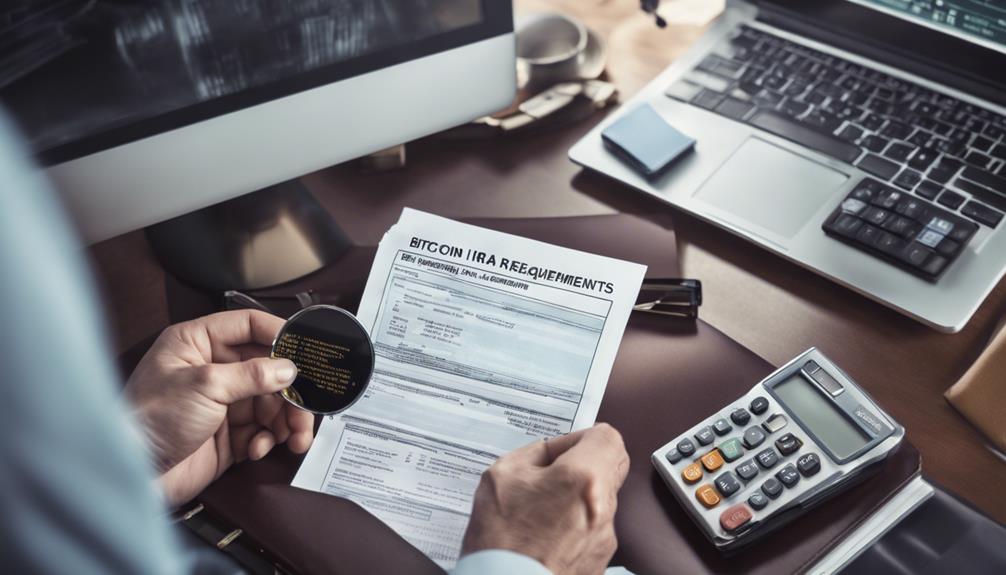Understanding Bitcoin IRA investment regulations is crucial for tax advantages and compliance. Specific rules, overseen by custodians, ensure adherence to tax laws and retirement guidelines. Contribution limits, currently set at $6,000 annually for those under 50, affect tax implications such as tax-deferred growth. Choosing between Traditional and Roth IRAs depends on individual goals and understanding IRS guidelines. Selecting the right custodian is essential for managing risks like market volatility and ensuring IRS compliance. Bitcoin IRAs offer tax benefits, diversification beyond traditional assets, and potential high returns. A thorough understanding of these regulations significantly impacts investment success, emphasizing legal compliance and maximizing tax advantages.
Key Takeaways
- Custodians oversee Bitcoin IRAs for compliance.
- Adherence to contribution limits is crucial.
- Proper reporting to the IRS is essential.
- Regulations influence tax advantages and strategies.
- IRS adjusts limits periodically for retirement savings.
Regulations Governing Bitcoin IRAs

What regulations govern Bitcoin IRAs to guarantee compliance with tax laws and retirement account guidelines?
Bitcoin IRAs, as self-directed IRAs, are subject to specific regulations to ensure compliance with tax laws and retirement account guidelines. These regulations enable individuals to include alternative assets like cryptocurrencies in their retirement accounts while maintaining the tax-advantaged status.
Custodians play a vital role in overseeing Bitcoin IRAs, making sure that investments are safeguarded and that all legal requirements are met. By adhering to these regulations, investors can confidently navigate the landscape of Bitcoin IRAs, knowing that their investments are protected and in line with the necessary guidelines.
Understanding the regulatory framework governing Bitcoin IRAs is essential for individuals looking to diversify their retirement portfolios with digital assets. Compliance with these regulations not only safeguards investments but also ensures that the tax benefits associated with retirement accounts are maximized.
Contribution Limits for Bitcoin IRAs

Contribution limits for Bitcoin IRAs mirror those of traditional IRAs, capping annual contributions at $6,000 for individuals under 50 and $7,000 for those aged 50 and above. These limits are vital to understand when managing IRA accounts, as exceeding them can lead to IRS penalties.
It's crucial to mention that the annual contribution limits apply collectively to all IRA accounts an individual holds, including both traditional and Roth IRAs. Contributions to Bitcoin IRAs can be made through cash deposits or rollovers from other retirement accounts, provided they adhere to the set limits.
The IRS regulations govern these limits, adjusting them periodically to regulate individuals' retirement savings. To guarantee compliance and maximize the benefits of investing in Bitcoin IRAs, investors should stay informed about the current contribution limits and plan their contributions accordingly.
Adhering to these limits safeguards the integrity of retirement investments and avoids unnecessary tax implications in the future.
Tax Implications of Bitcoin IRAs

When managing a Bitcoin IRA, it's important to understand the tax implications that come with the territory, particularly regarding profits, income, and gains. Bitcoin IRAs offer tax-deferred growth, where the profits, income, and gains generated within the account aren't taxed until withdrawals are made.
Roth Bitcoin IRAs provide the advantage of tax-free distributions upon retirement, potentially leading to significant benefits if Bitcoin prices increase over time. Additionally, contributions to Bitcoin IRAs can be tax-deductible in traditional IRAs, while Roth IRAs offer tax-free withdrawals, depending on the type of account chosen.
It's essential to navigate the tax implications of Bitcoin IRAs carefully, ensuring gains, losses, and transactions align with IRS guidelines for retirement accounts. By utilizing a Bitcoin IRA, investors have the opportunity to potentially reduce future tax bills by holding cryptocurrencies in a tax-advantaged account, making it a strategic option for long-term financial planning.
Choosing Between Traditional and Roth IRAs

In weighing the decision between Traditional and Roth IRAs for Bitcoin IRA investments, consider the tax implications and long-term financial objectives carefully. Traditional IRAs offer tax-deductible contributions and tax-deferred growth, making them ideal for those seeking immediate tax benefits.
On the other hand, Roth IRAs provide tax-free distributions in retirement, advantageous for long-term tax savings and potential future gains in Bitcoin prices due to tax-free profit distribution. Your choice between Traditional and Roth IRAs should align with your individual financial goals, tax situation, and investment horizon.
Understanding the tax implications and withdrawal rules of each IRA type is vital when making informed decisions about Bitcoin IRA investments. If you prioritize immediate tax benefits and expect a lower tax bracket in retirement, a Traditional IRA might suit you best.
Conversely, if you foresee higher taxes in the future or aim for tax-free growth, a Roth IRA could be more advantageous for your Bitcoin IRA investment strategy.
Compliance Requirements for Bitcoin IRAs

In order to guarantee compliance with IRS regulations for self-directed IRAs, Bitcoin IRAs must strictly adhere to set contribution limits and reporting guidelines. The IRS imposes specific rules on the maximum amount that can be contributed to a Bitcoin IRA annually, and failing to follow these limits can lead to penalties and tax consequences.
Additionally, proper reporting of contributions and withdrawals is essential to maintain transparency and compliance with IRS regulations. Custodians play an important role in overseeing these compliance requirements for Bitcoin IRAs, helping account holders navigate the complex rules set forth by the IRS.
It's essential for Bitcoin IRA investors to stay informed about the contribution limits, reporting guidelines, and other compliance requirements to avoid potential penalties and maintain the tax-advantaged status of their retirement accounts. By understanding and adhering to these regulations, Bitcoin IRA holders can secure their investments and plan effectively for their retirement future.
Impact of IRS Rules on Bitcoin IRAs

To grasp the full impact of IRS rules on Bitcoin IRAs, we must understand how compliance with these regulations influences the tax advantages and investment strategies available within self-directed retirement accounts. Ensuring adherence to IRA regulations is paramount when investing in crypto within these accounts. The tax advantages associated with Bitcoin IRAs are contingent on following IRS rules meticulously. Failure to comply can lead to penalties and the loss of tax benefits. By abiding by the IRS regulations, investors can optimize their retirement savings and potentially capitalize on the growth of cryptocurrencies like Bitcoin within a tax-advantaged account.
| Impact of IRS Rules on Bitcoin IRAs | |||
|---|---|---|---|
| Key Aspects | Compliance | Tax Advantages | Investment Strategies |
| Eligibility | Must comply | Tax benefits | Diverse options |
| Contribution Limits | Adherence required | Tax optimization | Strategic planning |
| Tax Implications | Critical for success | Potential savings | Growth potential |
Reporting Obligations for Bitcoin IRAs

Ensuring accurate and timely reporting of Bitcoin IRA values to the IRS is essential for compliance with regulations and maintaining tax-advantaged status. Custodians of Bitcoin IRAs play a vital role in fulfilling reporting obligations by providing the necessary information on Form 5498, which includes details such as contributions, fair market value, and distributions.
The IRS mandates that any gains or losses from Bitcoin transactions within an IRA must be reported, similar to other investment assets. Failure to report these transactions correctly can lead to penalties and tax implications for the account holder.
Proper reporting of Bitcoin IRA activities is paramount for upholding compliance with IRS regulations, safeguarding tax-advantaged status, and mitigating the risk of potential audit issues. By ensuring accurate reporting through collaboration with custodians and meticulous record-keeping, investors can navigate the complexities of reporting obligations effectively, thereby maintaining the integrity of their Bitcoin IRAs and preserving their tax benefits.
Custodian Selection for Bitcoin IRAs

When selecting a custodian for a Bitcoin IRA, it's crucial to evaluate their requirements, responsibilities, and duties. The custodian plays a pivotal role in securely storing and managing the digital assets held in the IRA.
Understanding what the custodian offers and ensuring they comply with IRS regulations are key factors in making an informed decision for your Bitcoin IRA.
Custodian Requirements for Bitcoin IRAs
Selecting an IRS-approved trust company or bank as a custodian for a Bitcoin IRA is essential for ensuring compliance with regulations and safeguarding cryptocurrency assets. Custodians play a critical role in managing Bitcoin IRAs, facilitating transactions, providing necessary reporting, and ensuring adherence to IRS guidelines.
Due diligence is paramount when choosing a custodian to protect investments and meet regulatory requirements. The custodian's selection has a substantial impact on the security, accessibility, and overall management of Bitcoin investments within an IRA.
Custodian Responsibilities and Duties
Our choice of custodian greatly impacts the security and management of Bitcoin investments within our IRA. Custodians for Bitcoin IRAs have important responsibilities, including ensuring compliance with IRS regulations, providing secure storage for digital assets, and facilitating transactions in cryptocurrency markets.
Selecting the right custodian is essential, as they need expertise in handling self-directed IRAs and understanding the complexities of digital assets. When researching custodians, investors should consider factors such as fees, security measures, reputation, and customer service.
Unlike traditional financial institutions, custodians in the cryptocurrency space offer specialized services tailored to the unique needs of Bitcoin IRAs. It's crucial to choose a custodian that can effectively manage and safeguard your investments while staying compliant with regulations.
Risk Management in Bitcoin IRAs

When managing risks in Bitcoin IRAs, it's important to consider diversification as a strategy for spreading risk across different assets.
Implementing security measures is essential to safeguard your investments against potential threats and ensure protection.
Developing strategies to navigate market volatility plays a key role in maintaining a resilient Bitcoin IRA portfolio.
Diversification for Risk
Diversifying investments across various asset classes is essential in managing risk effectively within Bitcoin IRAs. By spreading funds across different types of assets, such as stocks, bonds, and real estate within a Bitcoin IRA, investors can reduce the impact of market fluctuations and volatility.
This strategic allocation helps safeguard retirement savings from potential losses and enhances the long-term growth potential of the portfolio. Through diversification, investors can balance risk and returns, aiming for stability over time.
Security Measures for Protection
Implementing robust security measures is paramount in safeguarding assets within Bitcoin IRAs against potential threats and unauthorized access. When securing your Bitcoin IRA, consider the following measures:
- Utilize cold storage solutions to protect assets from online hacking attempts.
- Employ multi-signature authentication processes to prevent unauthorized access to funds.
- Conduct regular security audits and implement encryption protocols to enhance asset protection.
- Opt for custodians offering insurance coverage against theft, fraud, and cyber attacks to safeguard your holdings.
To maintain the integrity of your Bitcoin IRA, adhere to security best practices like strong password policies and two-factor authentication. By following these strategies, investors can mitigate risks and protect their investments effectively.
Market Volatility Strategies
To navigate market volatility effectively in Bitcoin IRAs, it's important to implement robust risk management strategies. Diversification, spreading investments across various cryptocurrencies, helps reduce the impact of market fluctuations.
Setting stop-loss orders and actively monitoring the market can aid in managing risks in Bitcoin IRAs. Employing a dollar-cost averaging strategy allows for the gradual investment of a fixed amount over time, smoothing out the effects of price volatility.
Ensuring secure storage solutions and staying informed about market trends are essential for managing risks associated with market volatility in Bitcoin IRAs. By combining these approaches, investors can better navigate the dynamic landscape of cryptocurrency investments within a Bitcoin IRA.
Benefits of Bitcoin IRAs

Considering the advantages of Bitcoin IRAs, one can appreciate the potential for tax benefits and portfolio diversification. When exploring the benefits of Bitcoin IRAs, several key advantages stand out:
- Tax Advantages: Bitcoin IRAs offer tax benefits similar to traditional retirement accounts, including tax-deferred or tax-free growth potential.
- Diversification: Investing in Bitcoin IRAs allows for diversification beyond traditional assets like stocks and bonds, reducing overall investment risk.
- Significant Returns: There's potential for significant returns on investments in cryptocurrencies like Bitcoin within a self-directed IRA, offering a unique opportunity for growth.
- Hedge Against Inflation: Bitcoin IRAs act as a hedge against inflation, providing an alternative investment avenue that can help protect the value of retirement portfolios over time.
Incorporating Bitcoin into an IRA not only provides potential for growth and diversification but also offers tax benefits and a hedge against inflation, making it a valuable addition to retirement planning strategies.
Frequently Asked Questions
How Does the Bitcoin IRA Work?
Bitcoin IRAs operate as self-directed retirement accounts tailored for holding cryptocurrencies like bitcoin. They offer a tax-advantaged way to invest in digital assets for retirement.
Account holders can fund these IRAs through rollovers or new contributions, providing flexibility in managing their investments. Special custodians are necessary for opening and managing these accounts, with companies like Bitcoin IRA and BitIRA offering tailored services for cryptocurrency investments.
Can You Hold Bitcoin in an Ira?
Yes, you can hold Bitcoin in an IRA. By utilizing a self-directed IRA and specialized custodians to adhere to IRS regulations, individuals can include Bitcoin in their retirement accounts.
This option allows for potential tax-free growth and diversification of investment portfolios. Investing in Bitcoin through an IRA provides control, flexibility, and the opportunity to hedge against traditional market risks, enhancing long-term investment strategies.
Do You Pay Taxes on Bitcoin Ira?
Yes, taxes on Bitcoin IRAs vary based on the IRA structure. Traditional IRAs may offer tax deductions for contributions but tax withdrawals as ordinary income.
In contrast, Roth IRAs involve after-tax contributions with tax-free withdrawals in retirement. Gains from Bitcoin investments in Roth IRAs are often tax-free, providing potential advantages.
Understanding these tax implications is essential for effective retirement planning and maximizing benefits.
Can I Withdraw Bitcoin From Bitcoin Ira?
Yes, we can withdraw Bitcoin from a Bitcoin IRA. Withdrawals must adhere to IRS regulations for traditional and Roth IRAs. Bitcoin held in a Bitcoin IRA can be converted to cash or transferred to a regular cryptocurrency wallet.
Early withdrawals before age 59 ½ may incur penalties and taxes. Roth Bitcoin IRAs offer tax-free contribution withdrawals, but earnings may be taxed. Consulting a tax professional or financial advisor is important for understanding implications.
What Are the Regulations for Bitcoin IRA Investments?
When it comes to investing in a Bitcoin IRA, it’s important to understand the bitcoin IRA investment rules. Regulations vary, but generally, the IRS allows for Bitcoin and other cryptocurrencies to be held in a self-directed IRA. It’s crucial to work with a reputable custodian who is well-versed in these specific investment regulations.
Conclusion
To sum up, maneuvering through the regulations of Bitcoin IRAs requires careful consideration to maximize investment potential.
Understanding contribution limits, tax implications, compliance requirements, and risk management is essential for a successful investment strategy.
By selecting the right custodian and choosing between traditional and Roth IRAs, investors can secure their financial future with the benefits of Bitcoin IRAs.
Stay informed, stay compliant, and watch your investment grow steadily over time.











